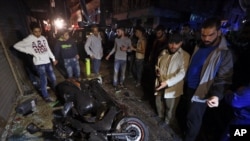The colors of the French flag -- blue, white and red -- dominated social media following Friday evening’s terrorist attacks in Paris.
The attacks killed 129 people and injured hundreds of others. The French president Francois Hollande called the Islamic State’s attacks “an act of war.”
Hours after the attacks, an image of the Eiffel Tower within a peace sign went viral, as did the hashtag #peaceforparis.
French officials turned off the lights and closed the tower, a symbol of Paris, for safety. Around the world, countries responded by shining the colors of blue, white and red on their own symbols and monuments.
Facebook let users change their profile photos to the colors of the French flag. The social media network also activated its Safety Check feature after the Paris attacks.
The social media site launched the feature in 2014 and has used it for people affected by natural disasters. It recently used the safety check-in after the earthquake that struck South Asia last month.
Paris was the first time the company used the feature for events other than a natural disaster.
The attention on the Paris attacks - both on traditional and social media - has led some people to ask a difficult question: Why Paris and not Beirut?
Just one day before the night of terror struck Paris, two suicide bombs exploded in downtown Beirut, Lebanon. Forty-three people were killed and nearly 200 were wounded. It marked the deadliest suicide bombing in Beirut since Lebanon’s civil war ended in 1990. The Islamic State also claimed responsibility for those attacks.
The New York Times wrote an editorial on the issue on Sunday.
And on social media, users questioned why the Lebanese flag was not an option for their profile photo.
For its part, Facebook explained over the weekend its decision to activate Safety Check. Co-founder Mark Zuckerberg posted on his Facebook page that the company plans to use Safety Check for more human disasters in the future.
“You are right that there are many other important conflicts in the world,” Zuckerberg wrote. “We care about all people equally, and we will work hard to help people suffering in as many of these situations as we can.”
A Lebanese doctor wrote a blog post about the difference in international response to the two terror attacks. Dr. Eli Fares wrote, “When my people died, no country bothered to light up its landmarks in the colors of their flags. When my people died, they did not send the world into mourning. Their death was but an irrelevant fleck along the international news cycle, something that happens in those parts of the world.”
Dr. Fares’ blog post has been shared on Facebook more than 270,000 times.
I’m Jim Tedder.
Ashley Thompson wrote this report for Learning English. Hai Do was the editor.
_______________________________________________________________
Words in This Story
natural disaster - n. a sudden and terrible event in nature (such as a hurricane, tornado, or flood) that usually results in serious damage and many deaths
activate - v. to cause (a device) to start working
irrelevant adj. not important or relating to what is being discussed right now






